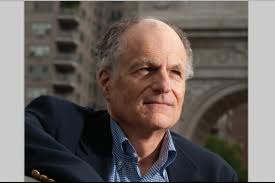
March 19, 2012
to be posted on SilentNusery.com and nobabies.net
Thomas Sargent
Department of Economics, New YorkUniversity:
19 W. Fourth Street, New York, NY 10012-1119
+1-212-998-3548
thomas.sargent@nyu.edu

thomas_sargent_nobel_prize_economics.png
Dear Professor Sargent:
I read (Yudhujit Bhattacharjee Teasing Out Cause and Effect in Macroeconomics SCIENCE vol. 334 no. 6053 October 14, 2012 page 164) that you and Christopher Sims have shared a Nobel Prize for your work on sorting out cause and effect in macroeconomics, for which most hearty congratulations. I have chosen to write you as I understand you take more of a long view of the issues. I take an even longer view.
It has been shown that animals, which generally have no power upon the hour nor thought for the morrow and are not thought to take into consideration the effects of political policy, have a definite relationship between their fertility and their population size. (R. Sibly et al., Science 309, 607 (2005)) As the mating pool size rises, population growth drops rapidly and then tends to level off below replacement level. This appears to have nothing to do with environmental issues.
This might seem irrelevant, but a study done in Iceland (A. Helgason et al., Science 319 813 (2008)) shows exactly the same relationship between kinship and fertility in humans. The same curve implies the same cause, which is unrelated to economics. In addition, a study done in Denmark (R. Labouriau, A. Amorim Genetics 178 601 (2008) and R. Labouriau, A. Amorim Science 322 1634 (2008)) shows the same curve and this time the question of economic factors was specifically addressed; once mating pool size and kinship are taken into account there is absolutely no detectable effect of education or of income on the number of children.
In analyzing economic behavior, of course you are forced to deal with decisions that are made in the context of other decisions. A government may influence interest rates with some expectation as to what people will do about it while people make economic decisions based on some expectation as to what the government will do about it. Even if there were not a myriad other factors, that alone would make analysis an unenviable task.
But here we have a phenomenon that is utterly independent of economic input, at least in the times and places studies, you know, with civil peace, reasonable prosperity, education, opportunity, freedom of choice, the kind of world we all want to live in.
Fertility depends on mating strategy alone. That drives all else. As I am wont to say, you don’t want to be friends with a classical hero. Their friends all get killed. The heroes serve the classical gods, and you don’t even want to see one of those; you could be turned into a spider or weed or something. The gods are helpless before the fates, one of which spins the thread of life, the second measures it and the third cuts it. It is seldom mentioned, but the fates must obey the stork; no stork – no thread. None to serve the gods. No heroes or poets. Satan can close shop for lack of souls to steal. As for getting reincarnated, forget it.
If you go to http://nobabies.net/Orlando%20meeting.html you can see some of the relevant graphs, the explanation as to why evolution has done this to us and see the dismally predictable way by which comes the blind Fury with th' abhorred shears and slits the thin spun life of civilization after civilization.
So I implore you to verify my citations and then return to your notes considering that it all begins with fertility. I think your results will be clear and unambiguous.
Can mating strategy change? Of course it can. It has done so in the past. Can it change in a manner that will let us survive? Well I hope so. Let me know how you feel about it.
Sincerely,
M. Linton Herbert MD

There have been 48,269 visitors so far.